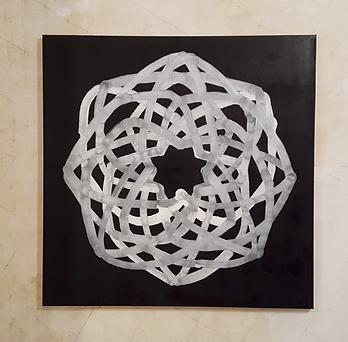Herman Van Ingelgem - Zur Gesundheit - until 8 February 026
Marc Rossignol
Synchrone
Opening Sunday 9 September 2018
Marc Rossignol
Synchrone
Opening Sunday 9 September 2018
Marc Rossignol
Synchrone
Opening Sunday 9 September 2018
Marc Rossignol
Synchrone
Opening Sunday 9 September 2018
Herman Van Ingelgem
Foreign Bodies & Protheses
06/09/2021 - 17/10/2021

_AnnieGentils_WesleyMeuris4640_web2.jpg)
_AnnieGentils_WesleyMeuris4636_web2.jpg)
_AnnieGentils_WesleyMeuris4635_web2.jpg)


DURING ART BRUSSELS THE GALLERY IS CLOSED.
WE ARE BACK TUESDAY 30 APRIL.
FINISSAGE: 5 MAY (3 - 6 PM) WITH WALKING LECTURE BY WESLEY MEURIS.
Preferability,
Wesley Meuris’s ninth solo show at the Annie Gentils Gallery presents in the form of narrative abstractions the artist’s fascination for cognitive relationships and logic mechanisms that regulate the entropic motion underlining the making and the unmaking of matter. Yet, the new pieces, conceived specifically for the occasion, stand out from previous works precisely by the use of other materials and for the definition of multiple new forms capable of detailing, like moulds, the premises for social dynamics not yet shared.
Thus, assembling panels (connection pieces-like) determine relational structures inhabited by antipodes (order and disorder, stable and unstable, wood and loam, data logics and natural laws, high technological tools and human accidental condition) that coexist peacefully with their own discrepancies. Watercolours and wooden panels transcribe possible diagrams, re-proposing, almost like a painting, the linearity of the landscape horizon. And archetypal architectural units suggest alternatives to the ordinary use of known materials.
Neither sculptures nor paintings, neither furniture nor architecture, the new forms of Wesley Meuris awaken the uncanny, the strangeness of everyday life, the impossibility of recognition despite the similarity and connection with the ordinary. No-man' lands. Preferably spaces where one can feel connected, and settled, where one can reconsider the material and its multiple effects, and limits, where one can embody the interior design that lies behind every form and thus think about the future and further ways of looking at it, because, after all, “yesterday’s tomorrow is not yet today”.
(Pamela Bianchi), February 2024 -

.png)
.png)